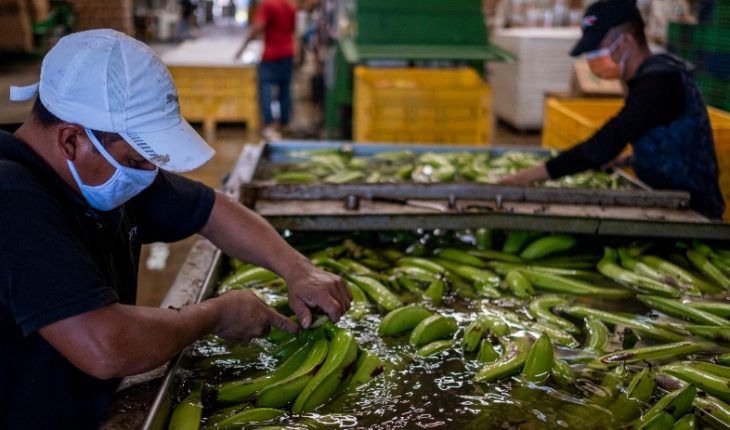With crops at risk of being lost to lack of labor, some farmers imported workers from Mexico to Puerto Rico, a U.S. island where receiving pandemic bonds is more profitable than working the field.
At Finca González, in the municipality of Guánica in the southwest of the Caribbean island, a group of Mexicans works in the packer; another washes the bananas and a third ties the tomato bushes to the stakes.
“This is very good. For those of us who are used to this, this is perfect,” says Abigain Sebastian, 22, without looking up from the tomatoes he ties up quickly.
“In Mexico the most I could be doing is seven bucks for the workday.”
In Puerto Rico, instead, Sebastian receives $7.25 an hour, which is the U.S. federal minimum wage.
“This money is a very stable aid,” says the young man. Wear long sleeves and a cap to protect yourself from the tropical sun.
For Puerto Ricans, on the other hand, $7.25 an hour is not enough, even though an unemployment rate of 9.2%.
Less so when, in the wake of the pandemic, the unemployed in this unscrused territory of the United States receive – as well as in the rest of the country – a weekly bond of $300 in addition to the unemployment benefit.
This is the case of Juan Santiago, who lives near Finca González although he prefers not to say where he worked. He lost his job in February and, with him, his salary of $290 a week.
He now receives $540 a week: $240 for unemployment benefit and $300 as part of president Joe Biden’s historic bailout plan on March 11.
“I do better than when I worked,” Santiago tells the AFP agency. “I wouldn’t earn that on the estate. There is little pay for employees of the estates. The bad is also the sun.”
Like Puerto Rico, a handful of the country’s 50 states, such as Texas and Pennsylvania, attach to the federal minimum wage of 7.25. The rest mostly impose minimum wages of around $10, according to the U.S. Department of Labor.
Sebastian arrived from Mexico in Puerto Rico last week, as part of a first group of 21 Chiapas workers brought in with the H-2A visa program for temporary agricultural workers. Seventeen of them went to Finca González.
“With this I also help my old lady who is a single mother. I have a 14-year-old sister,” says the day laborer.
“Logical that it is”
Economist José J. Villamil indicates that the labor market in Puerto Rico “is dysfunctional.”
Part of the problem, he said, is because Puerto Rican is a regional economy in the United States.
“As there is a large difference in wages between the island and other states, it is relatively easy for a Puerto Rican worker to go to the United States and benefit from a higher salary,” He wrote in a column Monday in the local newspaper El Nuevo Día.
Another factor in “dysfunction” is pandemic bonds, he says.
“Obviously, the appeal of working for $7.25 is lost and it makes sense that it is,” writes the expert.
Héctor Cordero, president of the Puerto Rico Farmers Association, told NotiUno 630AM radio last week that 1,000 to 1,500 braceros are needed on the island and that the arrival of a group of Hondurans is being processed.
Carlos González, the owner of the 375-acre estate named after him, accuses his compatriots of “losing the culture of work.”
However, it recognizes that federal aid is not solely responsible for the flight of workers.
Puerto Rico was hit in recent years by two category four hurricanes and a series of earthquakes that aggravated the financial crisis that has dragged the island for more than a decade.
And then, “with the pandemic, I don’t even tell you,” Gonzalez adds.
As a result of this perpetual state of crisis, the population of 3.1 million fell by 14.3% compared to 2010, according to the US Census.
“Everything continued to add up and there came a point where we didn’t get labor,” says González, who grows vegetables such as bananas, tomatoes, onions and pumpkin.
But “this situation is not from now on,” he adds. “It’s a historical thing and it comes from our colonial situation.”
What we do at Animal Politics requires professional journalists, teamwork, dialogue with readers and something very important: independence. You can help us keep going. Be part of the team.
Subscribe to Animal Politics, receive benefits and support free journalism.#YoSoyAnimal
translated from Spanish: Mexican day laborers go to Puerto Rico to work for $7.5 an hour
April 4, 2021 |





